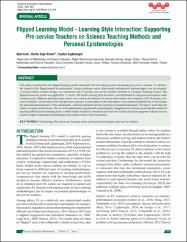Flipped Learning Model - Learning Style Interaction: Supporting Pre-service Teachers on Science Teaching Methods and Personal Epistemologies
Citation
Cam, A., Arslan, H. O., & Cigdemoglu, C. (2022). Flipped learning model - learning style interaction: Supporting pre-service teachers on science teaching methods and personal epistemologies. Science Education International, 33(3), 323-334. doi:10.33828/sei.v33.i3.8Abstract
This study revealed how the flipped learning model interacted with the learning styles of primary pre-service teachers. In addition, the impact of the flipped model on participants' science teaching course achievement and personal epistemologies was investigated. A mixed-method research design was conducted with 27 primary pre-service teachers enrolled in a Science Teaching Course. The flipped classroom model was applied for 15 weeks. The Kolb Learning Style Inventory was distributed to categorize participants under learning styles. Midterm and final exam scores were used as an indicator of course achievement and compared with 30 primary pre-service teachers' achievement from the previous semester. Lesson plans of the participants were analyzed qualitatively to investigate the personal epistemologies of the participants. Analysis indicated that flip learning environment supported "divergers" more than the others on course achievement. The level of sophistication on personal epistemologies changed across learning styles and the method of teaching differed across learning styles. Further studies need to be conducted to reveal how teacher education programs help pre-service teachers improve personal epistemologies and transfer them to their instruction.


















